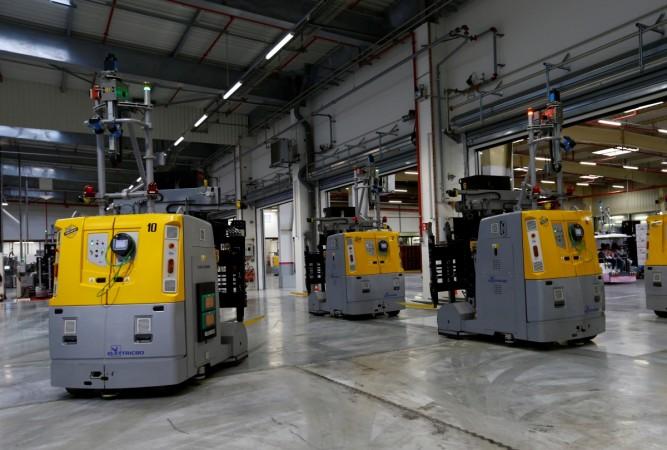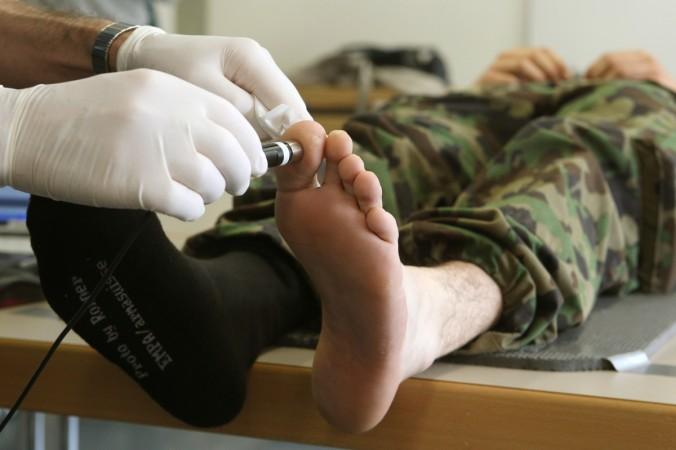
In the previous edition of this series I mentioned that with technology change, jobs are disappearing. But this is not a new phenomenon. When William Lee invented the knitting machine in 1589, the Government was not keen to promote it as they were concerned that his machine would steal the jobs of many citizens who were employed in knitting.
Prior to the industrial revolution, skills like knitting and smithing were highly valued, and craftsmen were highly paid and respected in the society. During the industrial revolution, the most expert of these craftsmen fiercely resisted the advent of every new machine and technology through collective guild activities. My mother used to tell me about how the labourers in my village resisted every move toward mechanizing farming, be it in ploughing, threshing or paddy harvesting, fearing that mechanization would render them unemployed. Of course, unemployment of craftsmen and farm workers did come. However, so did new jobs. Industrial revolution not only created more jobs, it also created better-paid jobs. Today, it is almost impossible to find a person who wants to work on the farm in my village and society as a whole is better off with the arrival of new technologies.
However, are things going to change in future ? I often discuss this matter with people who should be in the know. All that every planner and social scientist I talk to reiterate is the fact that despite the fear looming large for 500 years, no such complication has emerged till now. Currently, two questions face us: First, will there be enough jobs to employ the growing population when automation eliminates so many jobs. Second, even if new jobs are created, can those employees whose jobs became obsolete be retrained to take up the new jobs? I, for one, believe that Keynes' prediction of technological unemployment, where, "our discovery of means of economizing the use of labor outruns the pace at which we can find new uses of labor" is staring right at us.
The most obvious example is that of drivers (including airplane pilots, ship captains and locomotive drivers). Currently, millions of people are employed as 'professional' drivers, pilots and captains. However, trains have already begun going around without manual drivers. Much of the piloting in modern aircraft is done by computers. The technology for automated cars and trucks already exists and is in the pilot phase around the world. It is only a matter of time, from as little as ten years to at most twenty years, before the profession of drivers (including pilots and captains), as we know it, will vanish. Robots already fully, competently manage fork lift operations in major warehouses. When my nephew visited me in Geneva last year and saw that my house was not well kept, he sent me a robotic room cleaner as a birthday present. His wife, a software developer, programmed it so that it wakes up every Sunday at 8 AM, leaves its dock, goes around the four rooms in my house, cleans and gets back to its dock. So a robot is not something which exists only in Star Trek movies or a Honda shop floor. It is already in our homes!
It is not the case that all jobs will vanish overnight and get taken over by robots across the world. Instead, some aspects of most jobs will be expropriated by computers and robots. For example, people prefer that a human doctor interact with patients. But in the future, once the tests are run, diagnosis and medical advice will all be done by a computer. (For diseases such as cancer, this system is already in place at some of the best hospitals in the world). Then the doctor will appear again to brief the patient and family about the possible treatments. In operation theatres, once the patient is pacified and anaesthesia administered, surgery will be fully carried out by robots. After which the patient will wake up to a human presence, and so on. The future of those in the medical profession will depend on how well they can use computers and integrate their work with robots. Those who update themselves on technological innovations and secure their jobs will have added value and opportunities.
If you are a student and looking at what jobs will be available in the next twenty years or if you are employed but concerned whether your profession will remain viable in the coming years, you should read the Oxford Martin School's study, "The future of employment: how susceptible are jobs to computerization". After analyzing almost 800 job avenues in the United States, the study observes that 47 percent of them have high chances of computerization, 19 percent have moderate chances and the remaining 33 percent of jobs are at least temporarily safe. Both those who are already employed and those who are seeking employment must take note of this study. It is easier to observe their framework of which jobs will remain safe from the tentacles of automation, than visualizing what will happen to the present jobs. The study says that if the main part of your job is one of the following, then your job relatively safe from being automated:
- Social perceptiveness
- Negotiation
- Persuasion
- Assisting and caring for others
- Fine arts
- Originality
Within this context, let me try to describe some careers which are likely to evolve and strengthen in the coming years. This assumes that the location you are in has progressive economic policies and is on the trajectory towards global integration. If you find yourself geographically constrained, you may find your skills becoming stagnant and your value vanishing in global employment marketplace. You will have to take proactive action in both learning and choice of location to avoid this kind of a situation.
1. Political strategists: Democracy continues to flourish across the world and the number of non-democratic regimes is coming down. Even when people live in countries which are not democratic at the national level, there is a degree of political freedom and exercise of democracy at local grassroots levels. In a democratic regime where there is freedom for political expression, association and collective action, there will be a requirement for political strategists. In the past, political strategy was a job that was undertaken by political leaders and was the most decisive factor contributing to the success of a politician next only to communication strategy. However, with increase in size of the population, change in the way that people received information and the advent of social media, it has become important to de-link political leadership from political strategy. Political strategists, who need not be politicians, help political parties and leaders to design and align policies, communicate them effectively and harvest the results during elections.
2. Policy Analysts: Across the world, all corporations, institutions, cities and countries are all making policies all the time. Historically, policy-making was done as part of political or corporate strategy or as response to public reaction to an incident. But this is changing rapidly. All modern professional organizations and modern democracies are changing to evidence-based policy making. This means before a policy is made, all the available data on the topic is collected, systematically analyzed, and compared with the possible alternative policies. The economic costs of implementing the policies so formed as well as their unintended consequences are both analyzed. Broad knowledge in related subjects as well as access to international best practices on policy formation and initiatives are required to become a policy specialist.
3. Personal Health Advisors: In an emerging world where people become wealthier and live longer, they would need professional advice on handling their health-related matters. This may range from providing personalized advice to fixing lifestyle regimes, financial advice on insurance policies and technical advice on specific medical treatments to be done or plain advice as to which hospital to go to. Increasingly making complex end-of-life decisions, including what terminal healthcare one should opt for, whether to opt for euthanasia, whether to stay at home, a hospice or hospital, all these matters need expert advice.Personal health analysts thus should have skills relating to health matters, financial matters, law and counseling.
4. Personal Wealth Advisor: Personal wealth advisors help preserve the wealth of high net-worth individuals. Though this profession is not common now, it will increasingly become routine. With increasing wealth, increasing complexities in the way wealth can be accumulated, and complexities in family relationships, everybody will need the assistance of a personal wealth advisor. Personal wealth advisors are people who can advise you on how to plan your financial life, what instruments to invest in, what is the mix of the investment portfolio, and how to minimize tax liabilities and maximize returns.
5. Reputation Managers: Reputation is one of the biggest assets of individuals, organizations and countries that results in both tangible and intangible benefits for these entities. Political leaders, film stars and other celebrities always have to deal with issues involving their reputation. However, with the spread of social media and the lightning speed of communication networks, even ordinary people could be affected by issues related to reputation which need to be handled at extraordinary speed.

6. Security Expert: On the whole, it can be said that the world is becoming a safer place to live in, with much less number of people dying in wars or crimes. Yet with increasing wealth, travel, online exposure and less coherent family networks, the likelihood of being exposed to a petty crime, a terrorist attack or an online stalking is on the rise. Even European cities, where crimes had come down to historic lows, are once again becoming unsafe due to the constant threat of terrorist attacks. Organizations also wish to see how to conduct operations in a secure manner, how to keep their staff safe while at work and travel and how to deal with the security issues within the legal context of a country. Countries, organizations and individuals therefore will need advice form security experts to navigate through the different parts of the world. There is an entire new range of rules and advice that people are seeking to deal with terrorism-related security issues such as an active shooter in the workplace or evacuation drills during security incidents.
7. Safety Expert: People often don't understand the difference between safety and security and even experienced people use these terms interchangeably though they are not the same. Security deals with the hazards posed by an individual (organization or country) as a result of a malicious intent by another individual, organization or a country. Safety, on the other hand, deals with events that become hazards and where there is no malicious intent. The consequence of both may be identical, but the ways in which they are dealt with are different.
8. Geriatric Specialists: Geriatrics is the branch of medicine or social science dealing with the health and care of old people. It has not been a very popular topic in our society partly because till the recent past, families took care of the elderly in their families, so the need for institutional care was minimal. As the life expectancy of the population was not too high, the number of people needing specialized support was less. The facts that older people do not have economic independence and the society does not invest much in them are all reasons why geriatrics remains a marginal profession in our society.
9. Green Economy Experts: A Green Economy is defined as one that results in improved human well-being and social equality, while significantly reducing environmental risks and ecological scarcities. It is low-carbon, resource efficient, and socially inclusive. The thrust for green economy came from the fact that economic development in many parts of the world was accompanied by great social and ecological degradation which the conventional economy was not able to monitor or control. So while the country progressed by conventional measures of economics, it undermined the longer-term sustainability.
10. Climate Change Experts: Climate change was often considered a concern of the future generations with the role of the present generation limited to making policies aimed at minimizing the climate change potential and adapting to a change in climate. However, climate change is already around us and individuals, organizations and countries have to prepare for a changed and changing climate. There will be a large demand for experts with specialized knowledge in climate change.
11. Special Education Experts: With advent of progress in economic status and modern medicine, there is more realization that differently abled people are an asset to society if properly educated. By excluding them from the society, either because we did not have a method to train them or they did not have the mobility to reach the training centers, the society has lost a lot of talent in the past. The demand for teachers that can train children with special needs, from autism to visual challenges is on the rise and will continue for a very long time.
12. Volunteering Advisor: One of the characteristic of a modern civilized society is the explosion of altruism in the community. This will range from giving money to charity to volunteering for community causes. We will see the same trend happening in India too with more and more youngsters offering to do volunteering work. As people leave longer and healthier lives, retired people will also come into the pool of volunteers.
13. Learning advisor: Education is going to be a life-long activity in future with people spending shorter time in the universities at the beginning of their careers but returning to education from time to time to update skills and transit jobs accordingly. There will be need for full-time learning advisors who can help people through their journey of life-long learning

14. Physiotherapists: Physiotherapy is already a well-established profession in the modern economy but is not as well respected as it should be nor has it sufficiently penetrated into the developing economies. Physiotherapists help people who have been affected by disability, injury, illness or lifestyle through movement, exercise, education and advice. They play a great role in improving the quality of life of people with disabilities as well as people recovering from injury or illness.
I can list few more jobs which will be in high demand and I can also list some of the jobs which will vanish. However, it is much simpler for you to look at the job market and screen through the above framework and see what will remain and what will go. The job of a politician, which includes five of the above six attributes, except fine arts, is probably the safest of them all. Don't tell me I did not give you any clues!
Muralee Thummarukudy is the Chief of Disaster Risk Reduction at the UN Environment Programme and is based in Geneva, Switzerland. Prior to joining the UN, Muralee worked for Shell operated oil companies in South East Asia and Middle East. He has a PhD in Environmental Engineering from the Indian Institute of Technology, Kanpur.
(Opinions expressed are solely those of the author and need not necessarily reflect those of the United Nations.)

















